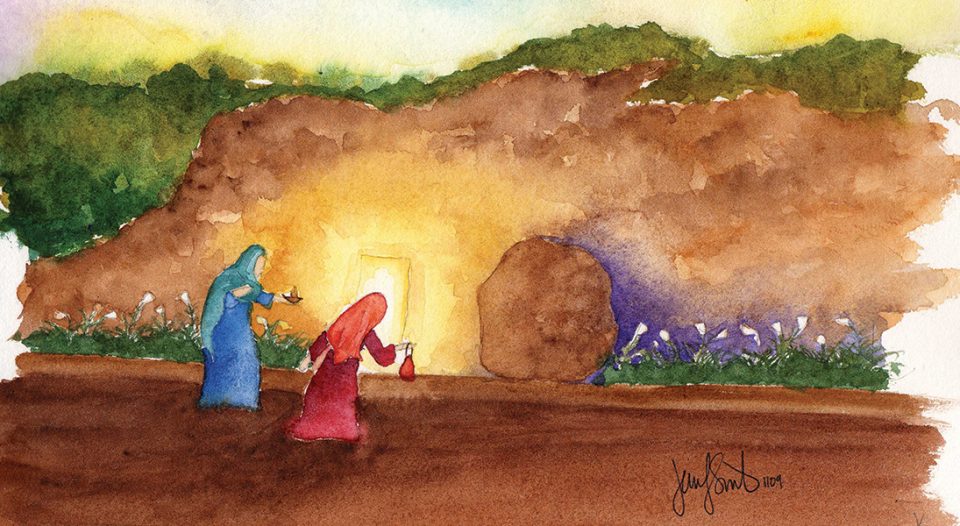Robert Goeser was leading his class at Pacific Lutheran Theological Seminary in Berkeley, Calif., through Martin Luther’s treatment of Jonah. As Jonah languished in the belly of the fish, Luther (and his spellbinding, disheveled mouthpiece, my professor) made a point that has stuck with me for 25 years: we know how the story ends; Jonah did not. Too much familiarity can strip a story of its emotional power.
Do we recognize how much Matthew’s account of the resurrection convulses with terror? God’s megawatt angel appears and slides back the hulking gravestone, causing an earthquake. For fear of him the guards shook and became like dead men (Matthew 28:4). When some of them finally wake up, they are bribed by frightened authorities into lying about what had happened. Meanwhile, the women are told: Do not be afraid—twice! The entire scene is drenched in fear.
The implications are mind-bending. Everyone knows that death is how our stories always end. With its sadness also comes a dreary sort of comfort—we know what to expect. Resurrection changes everything. If angels can invade and freeze security while a corpse returns to life, what kind of reality are we in? All rules are broken; all bets and safeties are off. Easter is scary.
This has enormous, fresh potency in our present climate. The cross and resurrection of Jesus testify to humanity’s seemingly endless capacity for horror-making, and also to God’s power to work both with it and against it for goodness and life. When chaos and fear overwhelm us, our faith repeats: Do not be afraid. Upheaval means God is up to something.
Remember Jonah, Luther teaches us. Remember Luther too. As we recount his story in this Reformation anniversary year, notice all the chaos and fear. The church put a bounty on his head. He was captured and locked away. He married an escaped nun. All this and much more in a time of high political anxiety and sweeping change across a bloody Europe. Our Lutheran story’s opening scene is drenched in fear.
Remember Luther and Jonah and the risen Jesus when reading news feeds about immigration politics, international saber-rattling, new technologies, environmental and human rights crises, and even the global dynamics of the church, which is growing in the south while shrinking in the north. We also live in a time of deep uncertainty and anxiety. As terrorists and politicians grasp at opportunities to leverage and exploit fear, Easter brings a different, stunning word: Do not be afraid. God is up to something here.
Easter brings a different, stunning word: Do not be afraid. God is up to something here.
This is both good and news. As Richard Rohr explains in his book Things Hidden: Scripture as Spirituality, “people have always been afraid of God,” seeking to control or placate God with religious efforts to keep God from showing up to bring death. Easter flips this on its head. The God who terrifies humanity shows up to bring life.
It begins with Jesus—and that’s scary too. One of the many things Easter means is total, cosmic validation of the heart-stopping things he said and did. Love your enemies, for example. Violence and self-protection give way to meekness and mercy. Healing and restoring others is prioritized over personal survival.
Follow me, he beckons on his way to the cross. Now Easter kills our excuses. Of all the people and prophets and teachers God could have raised from the dead, God chooses Jesus and gives him all authority in heaven and on earth. How does that change our lives and priorities? Easter is scary.
You can feel it in the sanctuary.
For many people, stepping into a church is scary. Old wounds, fresh judgment and desperate people may lurk inside. But Easter expectations prevail upon reluctant worshipers. Will Christ’s church comfort and welcome them with good news? Will the worship experience communicate Do not be afraid? Will they be surprised with joy?
Church leaders are scared too. Council members monitor attendance and offerings, warping Easter into a numbers test like a cholesterol level or a credit score. The pastor sweats her only chance to reach guarded and wary souls. Choir voices and altar servers suffer graceless demands of perfection. Will an anxious church communicate Do not be afraid?
Remember Jonah and Luther and Jesus. The outcome doesn’t depend on us but on our trustworthy God who is heaven-bent on overcoming death and fear with life and joy. God doesn’t insulate us from trouble but guides us through it. The great fish, the angry pope, even the brutal cross were no match for God’s saving, life-giving power.
So they left the tomb quickly with fear and great joy, and ran to tell his disciples (Matthew 28:8). We still don’t know how this story ends because now it’s our turn to live it. Everyone’s afraid. We can either be shaken guardians of a vacated past or stirred disciples racing forward with urgent good news. Let’s go.






